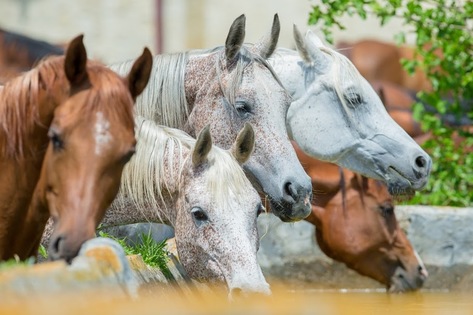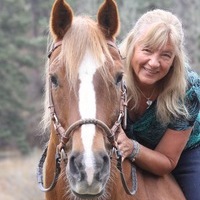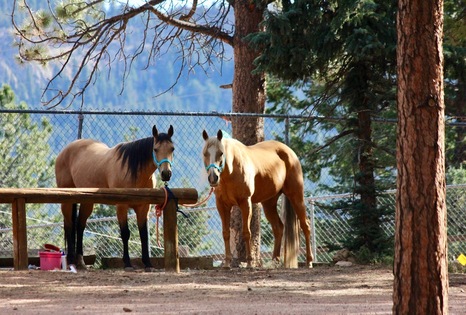
The Most Popular Horse Breeds Of 2019
Equestrian Advice & Guides General Equestrian
Build your business profile for FREE and expose your services to thousands of potential clients!
Create my profile now!
Buying your first horse is one of the most exciting and fun things to do when entering the world of horse ownership! You shop, you meet new people, new horses, and you fall in love; usually instantaneously and without hesitation. To make sure your purchase is a long-lasting, no-regrets experience, follow these ten pieces of advice.
1. Look at all the suitable horses, not just the pretty ones.
A good horse, the best horse, is the one that suits your ability and goals, is healthy, sound and sane.
If you buy based on color, you may be disappointed to be paying for a horse that looks good, but you can’t ride. Get past the pretty factor and look at the plain brown wrapper horses; the chestnuts and bays. Look at the conformation, the training, the breeding and the suitability rather than the color.
Pretty is as pretty does and green riders on green horses end up black and blue!
2. Buy a horse you can ride today.
Think of shopping for a horse as you might look at computer dating. Sure, look at the picture, but mostly read the words. Does the horse sound like what you are looking for? Is he a good match physically, emotionally, mentally, and experience level? Is he trained as you want or need?
Buy the horse that is already trained and you have ridden at least twice. Unless you are looking for a training project that will take lots of time and money before you are riding, don’t even bother looking at the pretty palomino that only costs $400.
3. Never buy a young child a green horse.
You’re putting your most precious on a living, thinking, reactive animal. It only makes sense to choose a well-seasoned, trained horse. Horses and children bond best when there is solid trust and communication in place. The only way to get that when children are learning is to make sure they are as safely mounted as possible and young horses usually don’t have the training or worldly knowledge a young, small rider needs.
We’re back to that green on green equals black and blue thing, aren’t we?
4. Auctions—the good, the bad and the ugly.
If you buy at auction, you have no way of knowing what you’re getting. You can’t ride the horse ahead of time, you can’t have a pre-purchase exam done and you are betting that this inexpensive animal is the horse of your dreams.
The good: Horses are usually much less expensive from an auction.
The bad: Horses may have something seriously wrong and you can’t see it.
The ugly: You may find that although you got an inexpensive horse, you may not have gotten what you wanted and must now figure out what to do.
Soundness issues can cost thousands and training issues can cause damage to life and limb.
Tread with caution on the auction lot and trust no one. It’s a big risk.
5. Rescues.
Recues have already gotten the horses at auction or through other means and they’ve done the hard work of evaluating the animal for training level, conformation, health, etc. Bonus: you will be able and encouraged to meet, ride and bond with the horse you choose.
Buying through a rescue is adoption and many people feel good knowing they’ve saved a horse from slaughter. Listen to your trainer and theirs to decide if the horse you choose is the best one for you and your family.
6. Impulse buying is not a great idea.
Try before you buy! Take your time. Meet the horse you love as often as you are able. You won’t want to drag your feet too long, but you don’t want to jump in too quickly, either. Again, follow the advice of your trainer regarding suitability and don’t forget that pre-purchase exam by a licensed and competent veterinarian.
7. Free horses.
Free. Sounds good, huh? And sometimes, a free horse is a great find. But the same things apply when taking on a freebie. Trainer must agree the match is stellar and vet must agree horse is healthy and sound.
Same cost to feed a free horse as one you paid for, but the difference may be in the usability factor.
8. If you are a beginner, look at older horses.
If you are new to horses or buying for a child, look for schoolmasters who will help teach without the angst of the horse’s inexperience hindering your progress.
The best way to lose interest in your horse is to get hurt; this applies to children and adults. An animal that weighs in at half a ton, has the dexterity of a cat, the wariness of a rabbit and the strength of a bull is an animal that should be regarded with respect.
Everyone started as a beginner and having that solid horse will make you the envy of your peers. And besides, there’s that saying about rather being safe than sorry!
9. “He leaned his head on my shoulder.”
Yeah, not a good reason to buy a horse. Just because he’s friendly and snuggly, doesn’t mean he loves you or connects with you or wants to go home with you. This one is tough for folks to get, and that’s understandable, but really, think about it. He can be the sweetest horse on the ground and happily dump you once your bottom hits the saddle.
Sure, it’s nice to have that connection from the start, but don’t buy him because of it.
10. DO NOT buy a horse without professional guidance!
This one is most important. Truly.
Get expert help and advice. Not a neighbor’s or your best friend, but a professional trainer who works in your chosen discipline. The trainer and a licensed veterinarian are your most important allies in this process.
Know that there are no perfect horses, but there are more perfect than others for you out there. Getting a trainer’s opinion on how well you match is the first step, then get a vet to come look over the horse for any health or soundness issues. This one step may save you financially and emotionally.
Fall in love, but do so with the right horse for you and you’ll have years and years of happiness and so will your horse!
*** Bonus! Here’s a FREE ORIGINAL ARTWORK Poster of the parts of the horse:
https://lp.constantcontact.com/su/VLwPi6X/HC2
Happy trails!
~Tanya Buck

